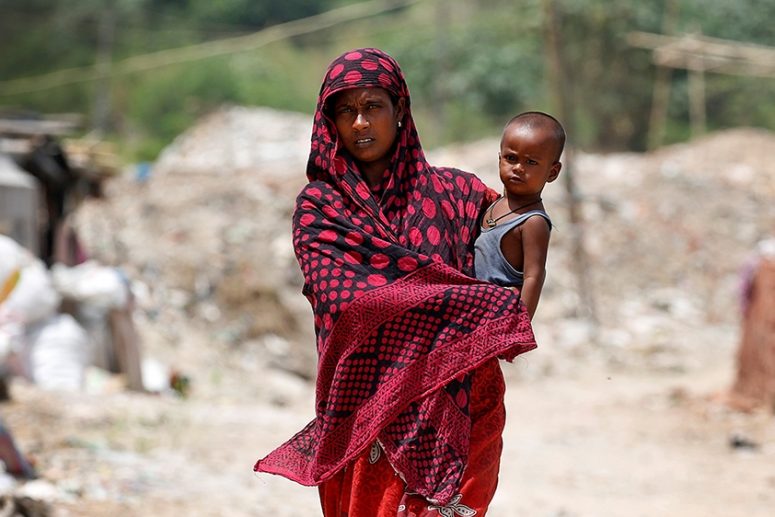Thousands of Rohingya in India battle hunger as a coronavirus outbreak in refugee camps looms large.
Din Mohammad is doing everything possible in his power to keep his family and fellow Rohingya refugees healthy during a three-week lockdown enforced by the Indian government to fight the coronavirus.
For the past week, Mohammad, 59, who lives with his wife and five children in Madanpur Khadar refugee camp in the capital, New Delhi, makes rounds of shanties to ensure people are maintaining social distancing and keeping their huts made from wood and plastic sheets clean.
But he knows these measures are hard to implement in crowded refugee camps like theirs, where people live in cramped conditions lacking basic facilities like toilets and clean water.
“We are literally sitting on a powder keg,” Mohammad told Al Jazeera. “It won’t take long before it explodes.”
Nearly 40,000 Rohingya Muslim refugees living in various refugee camps across the country fear that a humanitarian catastrophe looms large over them, as they have been left to fight the coronavirus pandemic alone.
Last Tuesday, Indian Prime Minister Narendra Modi announced the strict lockdown for India’s 1.3 billon people to prevent the spread of the virus that has killed more than 30,000 worldwide.
But the move has turned into a human tragedy, with tens of thousands of migrant workers fleeing cities, many of them forced to walk hundreds of kilometres to reach their homes, following the shutdown of businesses and factories.
Critics have accused the government of rushing with the lockdown without a proper plan. The South Asian nation has recorded 1,000 COVID-19 cases and 32 deaths so far.
About 100km (62 miles) south of the capital, nearly 400 Rohingya families live in a refugee camp in Ward No 7 of Haryana’s Nuh district. For them, having soap is a luxury, let alone buying facemasks and sanitisers.
Everyone is concerned about the virus but there is little they can do to protect themselves. Makeshift shanties that lean on each other make it impossible for people to maintain a distance. The overall sanitation is poor, with toilets unclean and access to healthcare, scarce.
Jaffar Ullah, a computer teacher, lives in one of the shanties. The 29-year-old finished his last bar of soap on Saturday. He does not have anything left to wash his hands with.
“Only a few families have soaps in our slum, while most of them can’t afford to buy one,” he told Al Jazeera.
The local municipal workers sprayed disinfectants in nearby residential areas – but not in the slums. Over the past few days, Ullah says, there has been a steady rise in cases of fever among the refugees.
“I don’t know whether it is related to coronavirus or not, but people are afraid and in fear,” Ullah told Al Jazeera. “They can’t go to hospitals because the regular OPDs (outpatient departments) are closed due to lockdown. No one from the administration has come to check on us.”
Most hospitals suspended their outpatient services following the announcement of the lockdown on March 24.
Last Thursday, Rohingya Human Rights Initiative (ROHRInga), a non-profit organisation based in New Delhi, conducted a door-to-door survey of 334 people living in the Madanpur Khadar camp and found 37 of them suffering from symptoms including fever, cough and runny nose – similar to those of the new virus.
“There is a serious risk of coronavirus outbreak in Rohingya refugee slums,” Sabber Kyaw Min from ROHRIinga told Al Jazeera.
“The Indian government is protecting its people while international organisations such as UNHCR (the United Nations refugee agency) have turned a blind eye towards us. We are literally left alone to fight this pandemic,” he added.
Meanwhile, the UNHCR office in New Delhi denied delaying its response and said it has been closely monitoring the situation in coordination with local non-profit organisations.
“We are very much on it. We did organise various COVID-19-related awareness programmes in slums over the last few weeks,” Kiri Atri, the assistant external relations officer, UNHCR, told Al Jazeera.
“From today onwards, we will start distributing hygiene kits containing soaps, while facemasks will be given on a case-by-case basis.”
‘Starving without food’
Badar Alam from Nuh refugee camp worked at a construction site as a daily wage earner, but he has not been able to work due to the lockdown. The 31-year-old says his family, including his wife and three children, have not had a proper meal in a week.
Alam is left with two kilos of rice, 250 grams of lentils and 250 rupees ($3) in his pocket, with no prospect of work for at least another two weeks. “What am I going to feed my children? Stones?” he asked.
Nearly 1,200 Rohingya families living in the Jammu district of the disputed Kashmir region, who rely on walnut factories for work, are also running short on grains. Refugees say that it is a matter of days before they will have to sleep with empty stomachs.
Hafiz Mubashar runs an Islamic seminary with boarding facilities for Rohingya children in the Bathindi locality of Jammu city. He shut down classes a week ago. But for the past three days he has been receiving calls from students seeking his help in arranging rice and flour.
“The lockdown has exacerbated our food woes,” Mubashar, 27, told Al Jazeera.
“Many of us are already starving, while others have shifted to eating one meal a day or resorted to cutting down their food intake.”
Mubashar believes that the next seven days will be critical for the Rohingya community, as most of the families will soon run out of their remaining grains.
“We are struggling with both hunger and coronavirus at the same time,” Mubashar said.
“But I think hunger will kill us before the virus does.”
Source: https://www.aljazeera.com/news/2020/03/kill-coronavirus-rohingya-india-200331035538875.html


